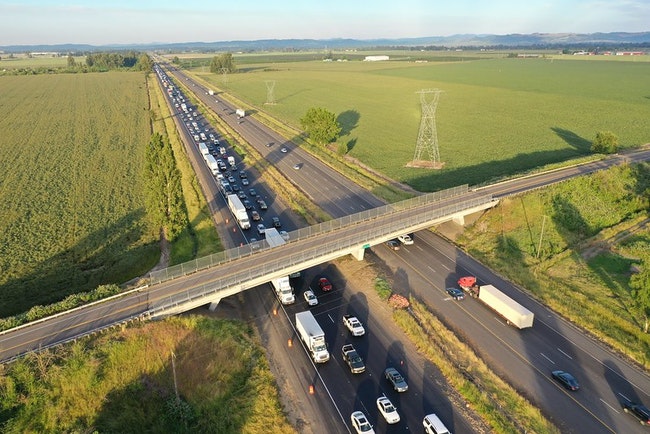
Oregon Department of Transportation photo
NOTE: Salem Reporter is providing free access to its content related to the coronavirus as a community service. Subscriptions help support this.
As the novel coronavirus took hold in Oregon, workers who perform one of life’s most routine jobs – pumping gas – started to panic.
In Pacific City, visitors in town for the first weekend of spring break swarmed one service station, prompting employees to walk off the job and forcing the station to close.
Across the state, service station owners started reporting growing fear and dwindling work forces.
“We have employees that are sick, uncomfortable about coming to work and staying home to take care of their kids,” one station owner wrote in an email shared by the Oregon Fuels Association. “This is creating a manpower shortage.”
Company after company in the early days of the pandemic’s spread in Oregon reported challenges keeping stations open.
On Saturday, Oregon State Fire Marshal Jim Walker suspended the state’s ban on self-service fueling, an order in place through at least April 11.
Rudy Owens, a public affairs specialist in Walker’s office, said a developing “critical shortage of workers” led to the decision, made in collaboration with Gov. Kate Brown. He said there was growing worry that essential workers who need to drive to get to work, such as health care workers and police and medics, would run out of places to fuel up.
“In certain parts of Oregon, if attendants are unavailable, there is no gas,” Owens said.
“Our hope is this is going to be very short term and that there is no harm.”
Owens said Oregonians who elect to pump their own gas have to take the same precaution they do with touching any other potentially contaminated service, whether it’s a grocery store cart or the door to a store. He said sanitizing and hand washing will be essential because station workers won’t be able to clean pump nozzles after every customer’s use.
Mike Freese, a lobbyist for the Oregon Fuels Association, said that station owners would use attendants to clean equipment as possible “but there is no assurance the equipment will get sanitized after every use.”
The association approached Brown’s office on Thursday, March 19, asking that the state’s ban be lifted.
“Many gas attendants are unable to come to work due to sickness, access to children issues (with children at home) as well as the plethora of issues people are facing right now,” Freese and his lobbying partner, Danelle Romain, wrote in an email to two of Brown’s staffers. “This is an emergency.”
The following day, the association shared reports it was getting from station owners across the state. The reports came before state authorities started listing a rapidly increasing number of Oregonians testing positive for COVID-19.
One company with 24 stations said one-third of its workers were off duty and that “employees are unwilling to continue face-to-face, hand-to-hand contact with customers.”
An executive with another company with 21 stations reported, “My managers are extremely concerned about getting people who are willing and feel safe enough to come to work.” The executive said one-fourth of its work force was off sick.
“We have one very busy station. We have only three employees. They are all sick,” another owner wrote.
In another location, “We have five employees, four of them called sick and the fifth was not comfortable to work out of concern for himself and his grandmother at home. We ended up closing the station.”
Romain said Saturday that stations have already closed in several cities, including Lake Oswego, Eugene, Government Camp, Clatskanie and Hood River.
Oregon and New Jersey are the only states to ban self-service gasoline. Oregon, however, allows exceptions. In 2016, residents in rural counties with populations under 40,000 gained the right to pump their own fuel at night. Last year, they were allowed to fuel anytime.
Editor Les Zaitz: [email protected]









